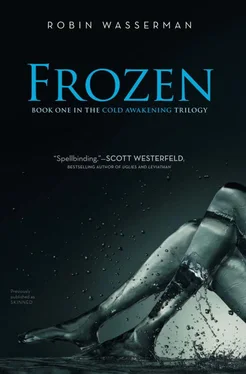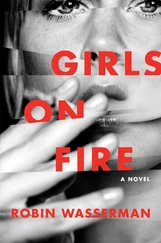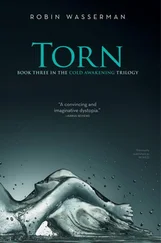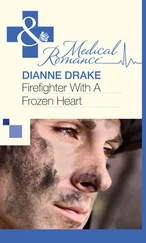I didn’t let myself think about it.
I swam.
And then I touched something that wasn’t rock, wasn’t mud, was firm and long and foot-shaped, and I wrapped my hand around it, around him. I scooped up his body and kicked toward the surface, burst out of the water. And only then did I force myself to look at what I was holding. His eyes were open, rolled back in his head. I had to turn away from the unbroken white stare. He wasn’t breathing.
CPR, I thought, towing him to shore. I voiced for help, gave our coordinates, and someone would come for us, to save us—but maybe not in time.
Make him breathe. Breathe for him.
But I didn’t breathe at all.
Still, there was air flowing through my throat, I thought. Hissing past my voice box, when I needed it, the stream of unfiltered air that made the artificial larynx vibrate so I could talk. I didn’t know if that would work. I had to try.
The network told me what to do. I tipped his head back. I placed my lips on his. They were so cold. Blood oozed from the cuts on his face, on his arms, blood everywhere.
Breathe, I thought, forcing the air through my mouth, into his. Pumping his chest, maybe in the wrong place, maybe too light, maybe too hard, I didn’t know, but pumping, once, twice, three times, thirty times, just like I was supposed to. I paused, I waited, I listened. No change.
I breathed for him again.
And again.
He coughed.
Water spurted out of his mouth, spraying me in the face.
“Auden.” I cradled his face. “Auden!”
He didn’t say anything. But he was breathing. I could hear him. I could see his chest rise and fall. He was breathing.
“I’m sorry,” I whispered. I laid my head against his chest, listening to his heart. Night had almost ended; the sky was turning pink.
He was still breathing when help arrived. They shifted him onto a backboard, immobilized his neck and spine, gave him an oxygen feed, loaded him into an ambulance. I got in after him, because no one stopped me.
It was only when someone wrapped a blanket around me that I realized I was still naked.
No one would tell me if he was going to be okay. But I promised him he would, over and over again.
His eyes opened.
“You’re okay,” I told him, holding his hand. His fingers sat limply in mine. “You’re going to be okay.”
“I hope not,” he croaked, his voice crackly.
For a second I was so happy to hear him speak that I didn’t register what he said.
“They’ll make me like you,” he whispered. “We can be the same.”
“No,” I whispered back, fiercely. “You’re going to be fine.”
That’s what I said.
That’s what I wanted to believe, about him, about myself.
I didn’t want to be a person who hoped he was right, that he would not be fine. I didn’t want to hope that he was hurt so badly that there’d be no other option, that he would die, only to be reborn as a machine, just so that I wouldn’t have to be alone.
I reminded myself what it would mean. I pictured him, even though it hurt— because it hurt—lying still on a metal slab, pale and cold, the white sheet draped over his skull, where his brain had been scooped out, carved up, replicated. I pictured him trapped in the dark, stuck in a frozen body, thinking he might be dead, then wishing he was.
I didn’t want that for him.
Or at least, I didn’t want to want that for him.
But truth? Sordid, pathetic truth? I think I did.
If Auden were a mech, if we could go through it together, everything would be different. I would no longer be alone.
“You’re going to be okay,” I said again, uselessly. It was better and less complicated than the truth, and maybe if I said it enough, it would come true.
“Liar.” His eyes rolled back in his head.
Somewhere, an alarm sounded, and one of the men pushed me out of the way.
“Flatline,” the man said, pushing on Auden’s chest, fiddling with a machine, as the alarm droned on.
“What’s happening?”
No one answered me.
The ambulance sped toward the hospital, and the men pounded on his chest, and the alarm beeped, and Auden’s chest lay flat, his lungs empty.
Flatline.
No heartbeat.
No life.
They’ll fix you, I thought, squeezing his hand, holding on, like I hadn’t in the water. They have to.
“Nothing hurts.”
At the hospital someone gave me something to wear.
Someone else brought bandages, patched up the gashes the rocks had torn in my skin. Even though there was no need. Nothing was gushing or dripping. Nothing hurt. Nothing had penetrated the hard shell around the neural cortex and—or so it seemed from the fact that I could still walk and talk—none of the complicated wiring beneath the surface had been shaken loose. I was fine. But I let them patch the skin. I nodded when they told me I needed to get myself checked out—somewhere else, of course, where they knew what to do with things like me. I would have agreed to anything as long as they let me stay.
Auden was gone, swept away behind a set of white double doors, and I sat on a blue padded chair, staring at nothing, waiting.
This isn’t happening, I thought, then cut myself off.
No denial. No rage, no bargaining, no acceptance. I wasn’t getting sucked into any of that five-stages-of-grieving shit, because he was still alive. Ergo, no grief. No denial.
This is happening.
I had wanted to feel. Now I wanted to stop. I wanted to be all those things people were afraid of. I wanted to be cold and heartless, like a computer, like a refrigerator, like a toaster. I wanted to turn myself off.
That, at least, I could do.
I didn’t.
The white doors swung open, and a doctor pushed through. He sat down next to me.
Not good, I thought. If it was good news, he would stay on his feet, he would spit it out quickly, so we could all sigh and laugh and go home. But bad news, he’d want to deliver that face-to-face. He’d want to be close enough that he could pat me on the shoulder. Or catch me if I passed out. Even though, as a doctor, he would know that was an impossibility.
“Has someone contacted his parents?” the doctor asked.
I nodded. “There’s just his father.” It was hard to get words out. Every time I spoke—every time I sent a blast of air through my throat, past my larynx, into and then out of my mouth, I remembered doing it for him, breathing for him, and I wondered if my air had been good enough, if I had been good enough or—
No. I am a machine, I thought. I could control myself. I could control my emotions. They weren’t real anyway, right? Whatever happened, I could handle it. I would handle it.
“He’s on his way,” I said in my pathetic little voice. I didn’t know that for sure, because I’d had to leave the message for him, bad enough, since how do you leave that kind of message? Hi, your son might be dead and if he is, it’s probably my fault. Have a nice day!
The doctor sighed. He had two thin scars in front of his ears and another set framing his nose, telltale signs that he’d just finished his latest lift-tuck. It looked good. I hated myself for noticing. “I should really wait for his guardian to arrive before I go into the specifics of his situation, but—”
“You have to tell me something ,” I pleaded. “Please.”
“ But , as I was about to say, I don’t think it would hurt to give you a general update.” He paused, and gave me a searching look like he was trying to figure out if I was prone to noisy and embarrassing breakdowns. I wondered if there was a private little room somewhere that they used for conversations like this, a walled-in space where you could shriek and throw things without inconveniencing all those people whose lives hadn’t just fallen apart.
Читать дальше












